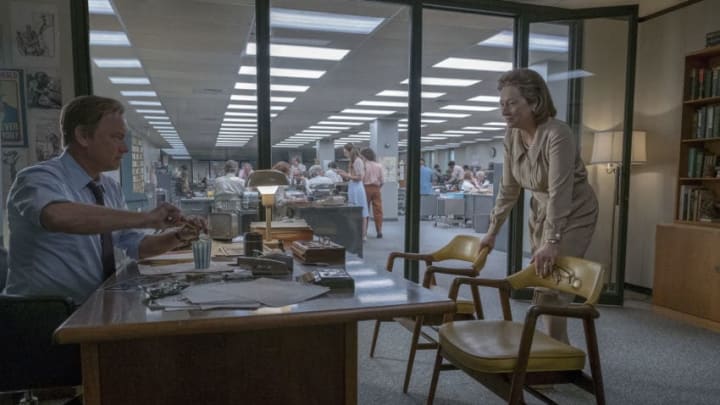The Post review: Spielberg hits home

Steven Spielberg sometimes ends up releasing two films in the same year. In 1993, it was Jurassic Park and Schindler’s List. In 1997, it was Amistad and The Lost World: Jurassic Park. In 2005, it was Munich and War of the Worlds. Now, in 2018, it’s The Post and the soon to be released Ready Player One. There’s an ongoing theme here, the popular and the serious. The drama and the spectacle.
The Pentagon papers were published in a pre-Watergate Nixon era White House, and ended up dramatically shifting the way the Press was viewed by the US Government. This is a subject Spielberg handles without the prescient knowledge of what is happening today.
There can be parallels, and there can be warnings. What Spielberg teaches us here is that history has a way of repeating itself. There should be small rebellion against the powers that do us wrong.
Meryl Streep and Tom Hanks lead the line as their counterparts Kay Graham and Ben Bradlee, respectively. Each of them are emotionally available, and are determined to be on the right side of history. Is this what Spielberg is teaching the audience? Are we meant to stand on the right side of history when the time calls for it?
More from Movies
- The story of a French emperor: Here’s where Napoleon will stream after theaters
- The Hunger Games: The Ballad of Songbirds and Snakes honors its origins and far surpasses them
- Thanksgiving movie death toll: Why [SPOILER] is still alive
- No, Thanksgiving is not streaming yet (But here’s where it’ll land)
- Trolls Band Together soundtrack guide: Which songs play in the movie?
It is no surprise for me to say that Steven Spielberg has made something remarkable. This isn’t showy filmmaking like some of his other dramas. This isn’t punching you in the face with sentimentality (not that I have a problem with that) like some of his other features. The Post is a story told with restraint, with careful and deliberate precision.
John Williams score is underplayed, subtle. He never outstays his welcome in The Post. For a few years now, I have been under the sneaking suspicion that long-time collaborator Janusz Kaminski (cinematographer of Spielberg since Schindler’s List) has been kind of reigning it in. But here, The Post has remarkable shots that add depth to the screen.
The color palette is muted but recalls the era of Alan J. Pakula (All The President’s Men, The Candidate, Klute) and Sidney Pollack (Three Days of the Condor). This is just as well, because The Post could fit in with any of those 1970s classics and be regarded as a peer.
It is funny that I have gone back to All The Presidents Men. The Dustin Hoffman and Robert Redford classic is one of the most important films of all time. A signal against the trappings of government. The Post goes in towards the more human struggle of this battle.
This “human,” more emotional view on the story is predominantly played with such class by Meryl Streep. Her character is surrounded by men wishing her to do the right thing for them. Whether it be money, security, the story, or her own company. The battle that Kay Graham had to fight in this era is nigh on unthinkable.
There is a shot towards the end of the film of Kay Graham walking out of the courthouse surrounded by women. A brief 45 second shot. This is Spielberg showing that power can be found in the female struggle. That power is there for women. The fight is ever-present for them. And there will be those that can be looked to for inspiration.
Next: Molly's Game review: Jessica Chastain owns the game
To do what is right. To stand on the right side of history. There is another story to be told after The Post ends. This is Steven Spielberg showing the audience that there is always something there to believe in. That there is something there to fight for.
In today’s environment, with my country (the United Kingdom) and this websites country (the USA) in political strife, where the people need to fight for what is right, The Post is a reminder that as long as there is a rebellion, a fight, a will, the battle will not be lost.
The Post is playing in theaters.